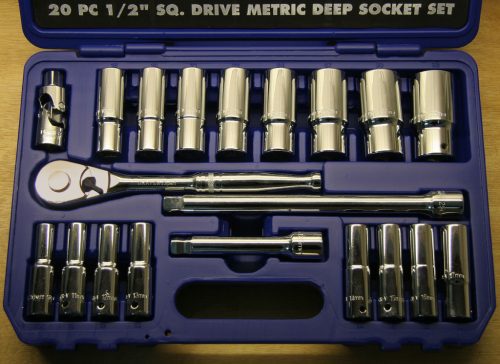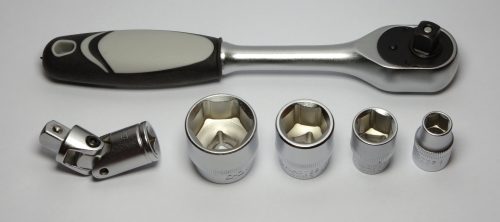A socket wrench is generally used for tightening or loosening different kinds of fasteners like nuts and bolts. They come with a long handle, which makes it easier to attach and tighten sockets/fasteners of varying shapes and sizes. Choosing the right socket size is extremely important because a big/unwieldy one can end up damaging your hands.
Due to this reason, even before you make your pick, it is extremely important to have an idea about the standard socket sizes in proper order. In the following section, we’ve added a comprehensive guideline about the standard socket sizes.
Standard Socket Sizes
Four of the most common socket drive sizes and the typical range of applicable socket sizes
- 1/4 inch drive (0.6 centimeters)- Works with 4mm to ( 4.5 mm, 5mm, 5.5 mm, 6 mm, 7 mm, 8 mm, 9 mm, 10 mm, 11 mm, 12 mm, 13 mm, 14 mm) 15 mm sockets.
- 3/8 inch drive (0.9 centimeters) – Works with 5.5 mm to 22 mm sockets.
- 1/2 inch drive (1.3 centimeters): Works with 8 mm to 30 mm sockets.
- 3/4 inch drive (1.9 centimeters)- Works with 36 mm to 80 mm sockets.
Other than these, there are also certain in-between socket sizes that start with ¼ inch (0.6 cm) and increase every sixteenth of an individual inch (0.16 centimeters).
Socket Type
In addition to the varying sizes, these sockets are also available in different shapes to fit the varying bolt heads. These shapes include-
- Six points or the hexagon sockets- Fits the regular hexagon bolts
- Eight points or the double square sockets- Fits the square bolts
- Twelve Points or the double hexagon sockets- Works with both your regular as well as square bolts.
While the twelve point socket seems like a strategic choice since its double positioning attaches the wrench quicker, it is still not a viable choice, due to the possibility of the socket slipping off. The six-point socket is a better option because it is tight and a tad more secure.
Converting a Standard Socket Size to a Metric Socket Size
As a large part of the world is replacing the standard socket size with the metric ones, it is extremely necessary to be able to properly convert (back and forth) between these two primary measurements. The size of a metric socket ranges between 3mm and 13mm. So if you’re using any metric nut, it is always better to use a metric socket for matching. In the same way, when you use a standard nut, make it a point to use a standard socket.
Things to Keep In Mind While Choosing a Socket
Standard sized, metric or Whitworth
While the standard sized sockets are the most conventional socket variant, most of the modern vehicles largely rely on the metric hardware that is measured in mm. You can choose a metric or a standard sized socket depending on your needs. However, you’ll also have the option of stocking both in your garage so that you always have the correct tools for your job.
Whitworth is the final type of socket which is only needed in British vehicles. So if you don’t have a British vehicle, you needn’t bother about it.

Source: Brian Snelson under CC 2.0
Size of the drive
Both the standard and the metric sockets are available in 1/4 inch, 3/8 inch, and 1/2 inch variants. However, each of them, require different kinds of ratchets and additional accessories like extensions. While the smaller sockets use drive sizes that are relatively small, the bigger ones use big drive sizes.
In case your socket set only comes with a single drive size, go for the 3/8 inch one for covering every major socket that you’ll be using. The smallest and the largest drives are also equally useful. While the small ones are typically designed for reaching smaller nuts/bolts in tight spots, the large drive sockets have the capacity of handling greater torque. They are ideal for bigger fasteners that need a long ratchet or a breaker bar for tightening or loosening them.
Deep or shallow socket
While both deep and shallow sockets are equally useful, the deep ones are particularly necessary for situations where your bolt has hit the deepest end of your socket. You should particularly get a spark plug socket because it ideally helps you work with any and every situation.
Socket Organizer
The variety of socket sets you find yourself acquiring will likely impact the type of socket organizer you will want to use. The primary factors will include the number of sockets and drive sizes needed to accommodate your sockets in an organized way.
